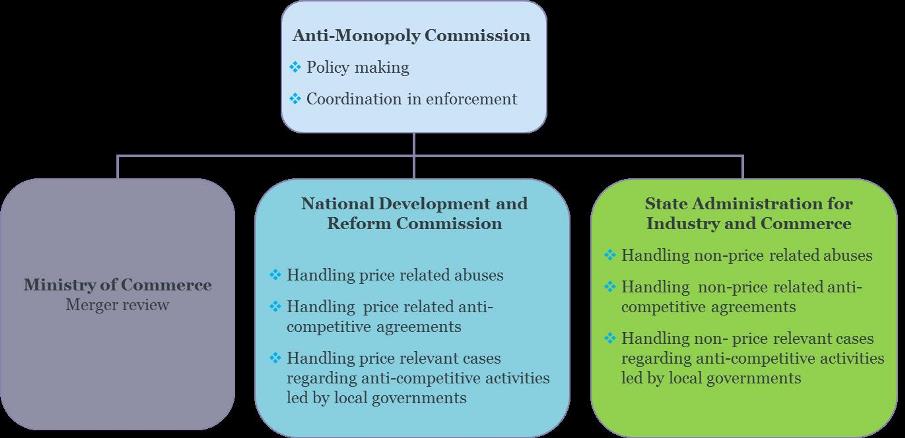2015年12月31日
中国の独占禁止法(競争法)当局がこの3年ほど、法の執行に非常に積極的になっている。中国独占禁止法の下では、中国の外で行われた反競争的行為であっても、中国市場に効果が及ぶ限り、法の適用対象とされ得る。本稿は、中国独占禁止法の積極的な執行によって日本企業が直面する潜在的リスクに注意を促すことを目的とし、日本企業を当事者として含む事例を中心に、中国の独占禁止法執行機関による最近の調査例、事件例を分析したものである。最後に、このような当局による執行強化から高まる独禁法リスクに対する対策について触れる。原稿の和訳は、海外ビジネス・法務に関する各種サービスや専門家向けのマーケティングサービスを提供するExpertMedia.jpが担当し、段落ごとに元の英文をつけた。
国際法律事務所バード&バード 中国弁護士
周 照峰(Zhaofeng Zhou)
 周 照峰( Zhaofeng Zhou)
周 照峰( Zhaofeng Zhou)中国独占禁止法は、中国内での反競争的行為と、中国市場に影響を有する中国外での反競争的行為の両方に適用される。言い換えれば、会社が中国外であっても、その製品が直接又は間接的に中国へ輸出されている場合、中国独占禁止法の適用対象となり得る。中国独占禁止法を違反した場合、企業の前年度収入に対して10パーセントを上限とする罰金の支払いを科せられる可能性がある。(The AML applies to both anti-competitive activities in China and anti-competitive activities outside China but having impacts on Chinese market. In other words, even a foreign company can subject to the AML if its products are exported to China directly or indirectly. The consequences of violating the AML include the fines up to 10% of the turnover of the previous year of the company involved.)
国家レベルにおいて、中国独占禁止法を執行する機関は、次の三つである。その一つは、国家工商行政管理総局(以下、SAIC)であり、非価格関連の反競争的行為、すなわち、非価格関連の反競争的協定、非価格関連の支配的地位の濫用、非価格関連の行政権限の濫用等につき、責任を有している。次に、国家発展改革委員会(以下、NDRC)は、価格関連の反競争的行為、すなわち、価格関連の反競争的協定、価格関連の支配的地位の濫用、価格関連の行政権限の濫用等に責任を有している。そして、三つめが中国商務部(以下、MOFCOM)であり、合併規制について責任を有している(注1)。(At national level, there are three antimonopoly enforcement authorities in China: (1) the State Administration for Industry and Commerce ("SAIC") is responsible for non-price related anti-competitive behaviors (including non- price related anti-competitive agreements, non-price related abuses of dominance and non-price related abuses of administrative power; (2) the National Development and Reform Commission ("NDRC") is responsible for price related anti-competitive behaviors (including price related anti-competitive agreements, price related abuses of dominance and price related abuses of administrative power; and (3) the Ministry of Commerce ("MOFCOM") is responsible for merger control.)
 チャート1:国家レベルの中国独占禁止法執行機関(Chinese antimonopoly authorities at national level)
チャート1:国家レベルの中国独占禁止法執行機関(Chinese antimonopoly authorities at national level)中国独占禁止法は2008年8月1日から発効したが、NDRCとSAICとが活発な活動を始めたのはここ3年のことである。次の表は、中国の競争法執行機関が科した高額罰金事例のトップ20事件を一覧したものである(注3)。これまでのところ、単独の企業に対して科された最高罰金額は60億元となっている。(Although the AML came into force on 1 August 2008, the NDRC and the SAIC only became very active in the last three years. The following table lists the top 20 individual company which has been imposed the highest fines by Chinese competition enforcement authorities. So far, the highest fines imposed on an individual company are RMB 6 billion.)
高額罰金事案トップ20 (List of top 20 cases)
| No. | 会社名 | 処罰対象 | 産業 | 罰金額 (単位:100万元) | 国 |
|---|---|---|---|---|---|
| 1 | Qualcomm | 支配的地位の濫用(過度の価格設定、抱き合わせ、不公正取引条件) | 通信 | 6088 | 米国 |
| 2 | Mercedes | 再販売価格維持 | 自動車 | 350 | ドイツ |
| 3 | 住友電気工業 | 水平的価格固定 | 自動車部品 | 290 | 日本 |
| 4 | Audi | 再販売価格維持 | 自動車 | 249 | ドイツ |
| 5 | Moutai | 再販売価格維持 | 酒 | 247 | 中国 |
| 6 | 矢崎総業 | 水平的価格固定 | 自動車部品 | 241 | 日本 |
| 7 | Mead Johnson | 再販売価格維持 | 人工ミルク | 204 | 米国 |
| 8 | Wuliangye | 再販売価格維持 | 酒 | 202 | 中国 |
| 9 | 日本精工 | 水平的価格固定 | 自動車部品(ベアリング) | 175 | 日本 |
| 10 | Dumex | 再販売価格維持 | 人工ミルク | 172 | フランス |
| 11 | Biostime | 再販売価格維持 | 人工ミルク | 163 | 中国 |
| 12 | デンソー | 水平的価格固定 | 自動車部品 | 151 | 日本 |
| 13 | NTN | 水平的価格固定 | 自動車部品(ベアリング) | 119 | 日本 |
| 14 | LG | 水平的価格固定 | LCD | 118 | 韓国 |
| 15 | ジェイテクト | 水平的価格固定 | 自動車部品(ベアリング) | 109 | 日本 |
| 16 | Samsung | 水平的価格固定 | LCD | 101 | 韓国 |
| 17 | CHIMEI | 水平的価格固定 | LCD | 94 | 台湾 |
| 18 | Abbott | 再販売価格維持 | 人工ミルク | 77 | 米国 |
| 19 | Friesland Campina | 再販売価格維持 | 人工ミルク | 48 | オランダ |
| 20 | 三菱電機 | 水平的価格固定 | 自動車部品 | 45 | 日本 |
上記表から、トップ20事例の中には日本企業が7社含まれていることがわかる。これは日本企業にとって警鐘となる。これら6社はすべて自動車部品の製造業者であり、NDRCが手掛けた次の二つの独占禁止法事案に関与している。(From the above table we can see that there are six Japanese companies whose fines are among the top 20 highest fines under the AML. This rings the bell for the Japanese companies. These six companies are all auto parts manufacturers and are all involved in the following two antitrust cases by the NDRC.)
日系自動車部品製造業者8社事件
2014年8月、日立オートモーティブシステムズ、デンソー、愛三工業、三菱電機、ミツバ、矢崎総業、古河電工、住友電気工業の日本の自動車部品製造業者8社が、2000年から2010年までの10年にわたり、2社又は複数当事者によって開催された複数の会合で価格と顧客に対する見積もりに関する情報交換を行った結果、違法な価格カルテルを行い、中国独占禁止法に違反したと認定された。共謀の結果、彼らは、エンジン、ワイヤーハーネスを含め、中国市場への13の異なる自動車部品の供給に対する価格見積において協力し、ホンダ、トヨタ、フォード製等、20種類以上の車両モデルに影響を与えた。(In August 2014, eight Japanese auto parts manufacturers Hitachi, Denso, Aisan Industry, Mitsubishi Electric, Mitsuba, Yazaki, Furukawa and Sumitomo were found to operate an illegal price cartel and breached the AML by exchanging information on price and customer quotations at a number of bilateral and multilateral meetings over a ten year period between 2000 and 2010. As a result of the collusion, they collaborate on price quotations for the supply of 13 separate car parts into the Chinese market, including on engines and wire harnesses, affecting more than 20 different car models including those manufactured by Honda, Toyota and Ford. )
この調査は、当局が2014年3月に実施した日立の事業所に対する抜き打ち調査の後に開始されたものであり、日立は数週間後、NDRCに対して、独占的協定に関して自発的に報告を行い、書面の証拠を提出した。日立は、NDRCに対して全面的に協力した結果、罰金を免除された。(The investigation was initiated following dawn raids conducted by the authority back in March 2014 at the premises of Hitachi, which a few weeks later self-reported to NDRC about its monopolistic agreements and provided written evidence. Hitachi was granted full immunity from the fines as a result of its comprehensive cooperation with NDRC.)
本調査後、NDRCは8社に対し、総額8億3196万元(米ドルで約1億3500万ドル)の罰金を科した(注4)。これまでのところで、同事件は、一件のカルテル事件における罰金としては最高額が科された事例である(注5)。8社に科された罰金は以下の通り。(Following its investigation, the NDRC imposed total fines on the eight manufacturers amounting to more than RMB 831.96 million (approximately $ 135 million). So far, this is the case in which the highest fines has been imposed in one cartel case. The fines levied against the eight auto parts manufacturers were as follows:)
| No. | 企業名 | 罰金額 (単位:100万元) | 対売上高比率 |
|---|---|---|---|
| 1 | 住友電気工業 | 290 | 6% |
| 2 | 矢崎総業 | 241 | 6% |
| 3 | デンソー | 150.56 | 4% |
| 4 | 三菱電機 | 44.88 | 8% |
| 5 | ミツバ | 40.72 | 8% |
| 6 | 古河電工 | 34.56 | 6% |
| 7 | 愛三工業 | 29.76 | 8% |
| 8 | 日立 | 免責 | 0% |
日系ベアリング製造業者4社の事案
2014年8月には、日系ベアリング製造業者4社(不二越、日本精工、NTNおよびジェイテクト)が、2000年から2011年にかけて、日本と上海で複数の会合を開き、同社等の製品に対して高い価格を設定するために共謀したと認定された。これらの会合で、価格の値上げ戦略、アジアと中国市場でのベアリングの値上げの時期と範囲、ならびに値上げ戦略の実践に関して情報交換をした。4社は、これらの会合で交換された価格情報または合意による共謀に基づき、中国におけるベアリング製品の値上げを行った。NDRCは、これらの製造業者はベアリングに関連して価格操作の合意に達していたと認定して、これらベアリング製造業者4社に対して4億344万元(約6570万米ドル)の罰金を科した(注6)。(In August 2014, four Japanese bearing manufacturers (Nachi-Fujikoshi, NSK, NTN and JTEKT) were found to held a number of meetings in Japan and Shanghai between 2000 and 2011 to collude with each other to set high prices for their products. During these meetings, they exchanged information concerning price increasing strategies, the timing and range of price increase of bearings in Asian and Chinese market, and the actual implementation of price increase strategies. The four manufacturers increased price of bearing products in China based on pricing information exchanged or collusion reached at these meetings. The NDRC concluded that these manufacturers had reached price-fixing agreement related to bearings and imposed total fines of CNY 403.44 million (approximately $65.7 million) on the four bearings manufacturers.)
自動車部品カルテル事案と同様に、1社はNDRCへの罰金支払いを免れている。不二越が当該価格操作協定を最初に通報し、NDRCの調査の全般に協力したため、中国における免責制度の恩恵を受けた。(As was the case with the auto parts manufacturer cartel, one company received full immunity from the fines imposed by the NDRC. Nachi-Fujikoshi benefited from the Chinese immunity regime after being the first company to have reported the price fixing agreements and for cooperating throughout with the NDRC’s investigation.)
NDRCが認定した罰金額は次の通り(The fines awarded by the NDRC were as follows:)
| No. | 企業名 | 罰金額 (単位:100万元) | 対売上高比率 |
|---|---|---|---|
| 1 | 日本精工 | 174.92 | 4% |
| 2 | NTN | 119.16 | 6% |
| 3 | ジェイテクト | 109.36 | 8% |
| 4 | 不二越 | 免責 | 0% |
クアルコム事件
知的財産権に関する濫用ルールを分析する前に、クアルコム事件について触れておく価値がある。本事件は、知的財産権の反競争的行使を論点とするものである。2015年2月、NDRCは、クアルコムに対して、標準必須特許に関する支配的地位を濫用したとして60億8800万元(約10億ドル)の罰金を支払うよう命じた。NDRCはその判決の中で、クアルコムは、幾つかの市場、すなわち、CDMA、WCDMA及びLTEワイヤレス通信標準に関する標準必須特許のライセンスとベースバンドチップセットの供給において支配的地位を有していると認定した。支配的地位の濫用と認定されたクアルコムの行為は次の三つである。(Before analysing the Abusing IPR Rules, it is worth mentioning the Qualcomm case since it involves the anti-competitive exercise of IPRs. In February 2015, the National Development and Reform Commission imposed a fine of RMB 6,088 million (nearly USD 1 billion) on Qualcomm for abusing its dominant position with regard to its standard-essential patents (“SEPs”). In its decision, the National Development and Reform Commission found that Qualcomm holds a dominant position in several markets, namely the license of SEPs for the CDMA, WCDMA and LTE wireless communication standards, as well as the supply of baseband chipsets. Qualcomm was found to have abused its dominant position in three ways:)
以上の濫用行為に基づいて、国家発展改革委員会(NDRC)は、およそ10億米ドルの罰金支払いをクアルコムに命じた。さらに、クアルコムは、ワイヤレス標準必須特許のライセンス条件を修正するよう義務付けられた。修正点は以下の通りである。(1)従前のような携帯電話端末全体の価格ではなく、各デバイスの正味販売価格の65%に対して、中国における特許実施料(技術によって3.5%か5%)を徴収すること、(2)ライセンスをする際には全ての特許一覧を提示し、特許権の権利期間が失効しているものについてライセンス料を徴収しないこと、 (3)対価なしで中国のライセンシーに対してクロスライセンスを求めないこと、 (4)正当な理由なく、ワイヤレス通信標準必須特許と非必須特許を抱き合わせてライセンスしないこと、(5)クアルコムのベースバンドチップについて、中国ライセンシーに対して不合理なライセンス条件に同意することを強要しないこと、かつライセンシー候補先が契約条件について争う事を禁じるのをやめること。(Based on the above abuses, the National Development and Reform Commission fined Qualcomm nearly USD 1 billion. In addition, Qualcomm undertook to make changes to the licensing terms of its wireless SEPs, which include: (1) charging royalties for its patents in China (3.5 or 5 percent, depending on the technology) on 65 percent of the net selling price of each device rather than the full price as previously; (2) providing lists of all its patents when licensing and not charging licence fees for expired licences; (3) not requesting cross-licences from Chinese licensees without payment; (4) not bundling licences of wireless communication SEPs with non-SEPs without any justification; and (5) promising, in relation to its baseband chips, not to force Chinese licensees to agree to any licence that imposes unreasonable conditions, and not to prohibit prospective licensees from challenging the terms of their agreements.)
中国独禁法の域外適用範囲は広いので、中国内に物理的な拠点がなくても、中国に対して直接又は、間接的に製品を輸出している日本企業は、中国独禁法に注意しなければならない。日本企業が中国における独禁法違反リスクを低減し、またはこれを予防するためには、自社の販売員や上級管理職等、自社のスタッフ向けのテーラーメードの競争法コンプライアンス研修を含む、中国競争法の遵守プログラムを社内で実施する必要がある。中国競争当局は反トラスト事案の調査において抜き打ち調査を実施することが増えているため、抜き打ち調査に対する適切な対応を図る内部システムを確立することが必要である。中国内において、代表事務所、支店又は子会社を持つ日系企業にとっては、これは特に重要である。中国は広いので、外部弁護士が調査対象とされた事業所に適時に到着するのは、ほぼ不可能である。したがって、企業としては抜き打ち調査に対する対応方法について、自社のニーズに即した研修をしておくことが最善の方法であろう。(Because of the broad extraterritorial jurisdiction of the AML, Japanese companies must pay attention to the AML even if they do not have physical presence in China but export directly or indirectly their products to China. In order to reduce or prevent the antitrust risks from China, Japanese companies need to establish a Chinese competition law compliance programme which includes tailor made competition law compliance trainings for their staff (e.g., sales people and senior managers) and a tailor made Chinese competition law compliance manual. Since the Chinese competition authorities increasingly carry out dawn raids when they investigate antitrust cases, companies need to establish an internal system to respond properly to dawn raids. This is particularly important for Japanese companies which have representative offices/branches/subsidiaries in China since their business premises in China will be dawn raided if they are investigated. Due to the large size of China, it is nearly impossible for external lawyers to travel to the investigated premise in time. Thus, it is very important that companies need to know how to respond to dawn raids. The best way to do that is to have tailor made trainings on dealing with dawn raids.)
既に述べた中国独禁法に対する一般的な対策のほか、日本企業としては特に、競争者との接触やコミュニケーションからの反トラスト上のリスクに注意する必要がある。これまで、日本企業が巻き込まれた全ての中国独禁法事案は、反競争的協定、特に、水平的な反競争的協定に関するものである。これは、日本企業は、文化的に、競争者間の競争を減ずるために競争者と協力する傾向がより強いからなのかもしれない。したがって、日本企業は、競合他社との連絡等については、反競争的な行為とみなされないよう、気をつける必要がある。(Except the above general strategies to cope with the AML, Japanese companies need to particularly pay attention to the antitrust risks from contacting/communicating with their competitors. So far, all Chinese antitrust cases involving Japanese companies are related to anti-competitive agreements, in particular horizontal anti-competitive agreements. This might be because culturally Japanese companies are more willing to cooperate with their competitors in order to reduce competition among them. Thus, Japanese companies need to pay attention to their contacts and communications with their competitors since such actions might be anti-competitive. )
まず、競合他社との連絡は可能な限り避けるべきである。次に、業界団体が組織した打合せに出席する前に、議題を確認しておく必要がある。法務部に議題を報告し、法務部はこの議題について評価をする。ミーティング中は、価格や市場の分割など、競争的に敏感な情報に関する議論をしてはならない。さらに、 知的財産権に関する独占的地位の濫用に注意を払う必要があるだろう。現在のところ、日本企業でそのような調査の対象となっている企業はないが、日本企業は大量の知的財産権を所有しているため、同様のリスクについて知っておかなければならない。知的財産権を持つこと自体は独占的な市場の地位を持っていることを意味しないが、ライセンス条件を交渉する際には独占禁止法上のリスクに気をつける必要がある。(First, they should reduce their informal contacts with their competitors as much as possible. Second, they need to have agenda before attending a meeting organised by their trade associations. The legal department shall be informed of the agenda and make assessment of the agenda. During such meeting, no discussion on competitively sensitive information is allowed, such as pricing and allocating markets. In addition, Japanese companies might need to pay attention to abuses of dominance in regard to IPRs. Although no Japanese company has been involved in such investigation, Japanese companies must be aware of such risks due to the large number of IPRs they own. Owning an IPR itself does not mean that the owner has a dominant market position. In particular, they need to be aware of the antitrust risks when they negotiate their licensing terms.)
クライアントが中国独占禁止法を守ることができるよう指導する際に、我々が使っている一般的なガイドラインは次の通りである。(In order to guide companies to comply with the AML, we provide general AML compliance guidelines as follow: )
中国独占禁止法遵守ガイドライン (AML Compliance Guidelines)
▽注1:中国独占禁止法の執行権限機関の組織構造に関するより詳細な説明は、Chinese Antitrust-Act II, Scene 1, 8(1)(2008), http://www.americanbar.org/content/dam/aba/publishing/antitrust_source/Oct08_Bush10_24f.pdfをご参照のこと。(For more explanation on the structure of the enforcement authorities of China’s antimonopoly law, please see Nathan Bush & Zhaofeng Zhou, “Chinese Antitrust—Act II, Scene I”, The Antitrust Source 1, 8(1) (2008), available at http://www.americanbar.org/content/dam/aba/publishing/antitrust_source/Oct08_Bush10_24f.pdf. )
▽注2:クアルコム事件の詳細については、本稿1.2クアルコム事件をご参照。(For more discussions of the Qualcomm case, please see the section 1.2 The Qualcomm case of this article. )
▽注3:The statistics were conducted by the end of May 2015.
▽注4:これらの企業に対するNDRCの決定については、http://jjs.ndrc.gov.cn/fjgld/を参照のこと。(For the NDRC's decisions against these companies, please visit http://jjs.ndrc.gov.cn/fjgld/. )
▽注5:クアルコム事件は支配的地位の濫用の事例であり、カルテルではない。(The Qualcomm case is about abuse of dominance, not cartels.)
▽注6:これらの企業に対するNDRCの決定は、http://jjs.ndrc.gov.cn/fjgld/を参照のこと。(For the NDRC's decisions against these companies, please visit http://jjs.ndrc.gov.cn/fjgld/.)
有料会員の方はログインページに進み、朝日新聞デジタルのIDとパスワードでログインしてください
一部の記事は有料会員以外の方もログインせずに全文を閲覧できます。
ご利用方法はアーカイブトップでご確認ください
朝日新聞デジタルの言論サイトRe:Ron(リロン)もご覧ください